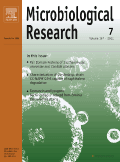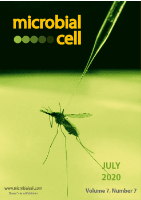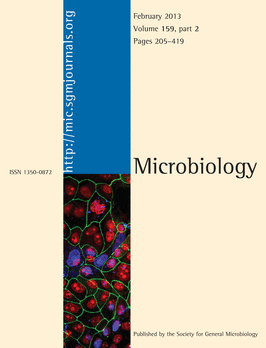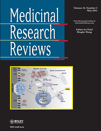
Advancements in Life Sciences
Scope & Guideline
Elevating Research Standards in Biochemistry and Genetics
Introduction
Aims and Scopes
- Clinical Research and Health Sciences:
This area encompasses studies related to human health, including clinical trials, disease mechanisms, and therapeutic interventions. The journal emphasizes translational research that bridges laboratory findings with clinical applications. - Microbiology and Infectious Diseases:
Research in this scope focuses on microbial pathogens, their interactions with hosts, and the development of antimicrobial strategies. Topics include antibiotic resistance, microbial forensics, and the role of microbiota in health and disease. - Pharmacology and Therapeutics:
This includes the study of drug mechanisms, the development of new therapeutic agents, and the role of natural compounds in disease management. The journal highlights innovative approaches to drug discovery and the therapeutic potential of traditional medicine. - Agricultural and Environmental Sciences:
The journal publishes research on sustainable agricultural practices, crop improvement, and the impact of environmental factors on plant and animal health. This includes studies on biosecurity, pesticide resistance, and the use of biopesticides. - Biotechnology and Genetic Research:
This area covers advancements in genetic engineering, molecular biology, and biotechnological applications in health and agriculture. The focus is on innovative techniques like CRISPR and other genetic manipulation methods to enhance crop resilience and disease resistance.
Trending and Emerging
- Precision Medicine and Genomics:
There is an increasing emphasis on personalized medicine, particularly genetic profiling and biomarker identification, to tailor treatments to individual patient needs. This trend aligns with advancements in genomics and biotechnology. - Nanotechnology in Medicine and Agriculture:
Research exploring the application of nanotechnology for drug delivery systems and agricultural enhancements is on the rise. This trend is driven by the potential for nanomaterials to improve therapeutic efficacy and crop resilience. - Environmental Health and Sustainability:
Recent studies are increasingly focusing on the impact of environmental factors on health, including pollution, climate change, and sustainable agricultural practices. This reflects a broader societal concern for health in the context of environmental stewardship. - Immunology and Infectious Disease Research:
The focus on immune responses to infections, particularly in light of the COVID-19 pandemic, has surged. This includes studies on vaccine development, immune modulation, and the role of the microbiome in health. - Bioinformatics and Computational Biology:
With the rise of big data in life sciences, there is a growing trend towards the use of bioinformatics tools for analyzing complex biological data, supporting drug discovery, and understanding disease mechanisms.
Declining or Waning
- Traditional Herbal Medicine:
Although herbal therapies were once a significant focus, recent publications indicate a waning interest as more researchers turn to synthetic compounds and advanced pharmacological approaches for disease management. - Generalized Animal Studies:
Research focused solely on animal studies without direct clinical relevance is decreasing. This may be due to a growing preference for studies that offer more immediate implications for human health or agricultural productivity. - Basic Agricultural Practices:
While agricultural research remains important, studies that do not incorporate innovative technologies or sustainability practices are becoming less common. The trend is shifting towards research that integrates modern biotechnological methods.
Similar Journals

Ankara Universitesi Veteriner Fakultesi Dergisi
Disseminating groundbreaking insights for animal welfare.Ankara Universitesi Veteriner Fakultesi Dergisi is a prominent academic journal published by ANKARA UNIV, focusing on advancements in veterinary sciences and animal biology. Since its inception, the journal has been committed to disseminating high-quality research, featuring articles that span a variety of topics within veterinary medicine and animal science. With an ISSN of 1300-0861 and an E-ISSN of 1308-2817, this journal provides valuable insights into the latest research developments and trends, making it a critical resource for researchers, professionals, and students in the field. The journal has established itself within the scholarly community, achieving a Q3 rank in Animal Science and Zoology and a Q2 rank in Veterinary (miscellaneous) as of 2023, reflecting its growing relevance and impact. Positioned in Turkey, it serves as a vital platform for both local and international scholars to share innovative findings and foster collaboration. Enhancing its accessibility, the journal's content is available through various academic databases, ensuring that its readership can effortlessly access and engage with cutting-edge research.

3 Biotech
Pioneering Research in Agricultural and Environmental Sciences.3 Biotech is a prestigious interdisciplinary journal, published by SPRINGER HEIDELBERG, focusing on the evolving fields of biotechnology, agricultural and biological sciences, and environmental science. With an impressive impact factor and categorized in Q2 across multiple fields in the 2023 rankings, this journal stands out for its contribution to innovative research and its commitment to advancing scientific understanding. Featuring rigorous peer-reviewed articles, it serves as a vital resource for researchers, professionals, and students alike, further enhanced by its significant presence in Scopus rankings. This journal facilitates open discussions and collaborative efforts, aiming to bridge the gap between theoretical research and practical applications in biotechnology. As it continues to publish impactful studies from 2011 to 2024, 3 Biotech is dedicated to shaping the future of biosciences and fostering meaningful scientific advancements.

Open Life Sciences
Fostering Innovation in Life Sciences ResearchOpen Life Sciences is a distinguished open-access journal published by DE GRUYTER POLAND SP Z O O, dedicated to advancing research across diverse disciplines in the life sciences. Since its inception in 2014 and transitioning to open access in 2015, the journal has become a pivotal platform for researchers, fostering the dissemination of high-quality scientific work while ensuring that valuable findings are freely accessible to the global community. With an impressive categorization into Q2 in Agricultural and Biological Sciences and Q3 in several other fields including Biochemistry and Immunology as of 2023, Open Life Sciences promotes innovation and knowledge sharing across its broad spectrum of topics. The journal's commitment to excellence is reflected in its competitive Scopus rankings, making it an essential resource for professionals and students alike who are keen to stay at the forefront of life sciences research.

aBIOTECH
Fostering collaboration for a thriving scientific community.aBIOTECH, published by SPRINGERNATURE, is a premier academic journal dedicated to advancing the fields of biotechnology, agronomy, and molecular biology. With an impressive ISSN of 2096-6326 and E-ISSN 2662-1738, this journal has established itself as a vital resource for researchers and professionals aiming to publish high-quality, impactful studies. Based in Singapore, aBIOTECH has achieved remarkable recognition, boasting a Q1 ranking in multiple categories including Agronomy and Crop Science, Biochemistry, and Genetics in the 2023 Scopus rankings. Its solid position in the 90th percentile for Biochemistry and Genetics reinforces its significance within the global scientific community. The journal covers a broad spectrum of topics relevant to both basic and applied research, facilitating a shared dialogue amongst scientists and encouraging collaborative progress in innovative biotechnological applications. The open-access nature of the journal ensures that cutting-edge research is freely available, fostering a global exchange of ideas that is critical to the advancement of science today.

Revista Colombiana de Ciencias Pecuarias
Fostering Collaboration in Veterinary and Agricultural AdvancementsRevista Colombiana de Ciencias Pecuarias, an esteemed publication in the field of Animal Science and Veterinary Studies, is published by the Universidad de Antioquia, Faculty of Agricultural Sciences. Since its inception in 1996, this Open Access journal has become a vital resource for the dissemination of research and advancements within the agricultural and biological sciences, specifically targeting the veterinary and animal husbandry sectors. Situated in Colombia, its mission is to support and promote scientific knowledge through rigorous review processes and high-quality articles. The journal’s recent classification includes Q4 in Animal Science and Zoology and Q3 in Veterinary categories, illustrating its commitment to enhancing its scientific impact. As it converges from 2008 to 2024, this journal aims to engage researchers, professionals, and students alike, establishing a collaborative environment for innovative research and findings that shape the future of animal sciences globally.

MICROBIOLOGICAL RESEARCH
Advancing the Frontiers of Microbial ScienceMICROBIOLOGICAL RESEARCH, published by Elsevier GmbH, serves as a leading platform for advancements in the field of Microbiology, holding an impressive Q1 ranking in its category as of 2023. With an ISSN of 0944-5013 and E-ISSN 1618-0623, this journal has been instrumental in disseminating high-quality research since its inception in 1994 and continues to contribute significantly to the academic landscape through 2024. Positioned within the top 13% of publications in the Immunology and Microbiology category, ranked #24 out of 182 according to Scopus, it attracts the attention of researchers, professionals, and students alike. While the journal is not open access, it offers vital insights and peer-reviewed articles that drive innovation and exploration within microbiological research. Its rigorous selection process underscores the importance of quality and relevance in advancing knowledge in this dynamic field.

Journal of Biological Research-Thessaloniki
Connecting Researchers to Transformative Biological Insights.Journal of Biological Research-Thessaloniki, published by Aristotle University of Thessaloniki, is a distinguished academic journal committed to advancing the fields of Agricultural and Biological Sciences and Biochemistry, Genetics and Molecular Biology. As an Open Access journal since 2004, it provides a platform for the rapid dissemination of innovative research that spans diverse biological disciplines. With an impact factor that situates it in the Q2 category for Agricultural and Biological Sciences and Q3 for Biochemistry, Genetics and Molecular Biology as of 2023, the journal demonstrates a significant contribution to its respective fields. Located in Thessaloniki, Greece, it serves a global audience of researchers, professionals, and students eager to access quality scientific content. The journal is dedicated to publishing original research articles, reviews, and critical commentaries, encouraging collaboration and dialogue amongst scientists dedicated to the frontiers of biological research.

Microbial Cell
Pioneering discoveries in biochemistry and molecular biology.Microbial Cell is a distinguished open-access journal published by SHARED SCIENCE PUBLISHERS OG, focusing on the dynamic fields of microbiology, biochemistry, and molecular biology. Since its establishment in 2014, Microbial Cell has been at the forefront of disseminating cutting-edge research essential for advancing our understanding of microbial functions and interactions. With a commendable impact factor and ranking in the top quartiles (Q1 and Q2) across several categories, including Applied Microbiology and Biotechnology and Parasitology, this journal serves as an invaluable resource for researchers, professionals, and students alike. It features a comprehensive scope that encompasses the latest findings in genetics, cell biology, and virology, facilitating the academic community's access to high-quality peer-reviewed work. Microbial Cell not only contributes to advancing microbial sciences but also fosters an inclusive platform for knowledge sharing and collaboration in the scientific community.

MICROBIOLOGY-SGM
Championing significant findings in microbiological sciences.MICROBIOLOGY-SGM, published by the esteemed MICROBIOLOGY SOC in the United Kingdom, is a pioneering journal dedicated to advancing the field of microbiology. With its ISSN 1350-0872 and E-ISSN 1465-2080, the journal serves as a vital platform for researchers, professionals, and students to disseminate significant findings and engage in the latest developments in microbiology. Since its inception in 1994, MICROBIOLOGY-SGM has upheld rigorous academic standards, demonstrated by its position in the Q2 quartile of the 2023 Scopus category for Microbiology, ranking #108 out of 182. While traditionally not an open-access journal, it offers a rich selection of articles that address a variety of topics within the microbiological sciences. As we approach 2024, the journal continues to foster collaboration and knowledge exchange, making it an indispensable resource for those at the forefront of microbiological research.

MEDICINAL RESEARCH REVIEWS
Advancing the Frontiers of Therapeutic InnovationMEDICINAL RESEARCH REVIEWS, published by Wiley, is a leading journal in the fields of Drug Discovery, Molecular Medicine, and Pharmacology. With an impressive impact factor and esteemed standing in its category quartiles (Q1 in all three fields), this journal serves as a vital platform for the dissemination of cutting-edge research and reviews that drive innovation in therapeutic development and molecular health sciences. Since its inception in 1981, MEDICINAL RESEARCH REVIEWS has garnered a robust readership within the scientific community, underscored by its high rankings in Scopus – where it ranks #3 in Pharmacology and #2 in Drug Discovery, placing it within the top echelons of academic influence. Researchers, professionals, and students alike benefit from its rich content and comprehensive approaches to tackling complex medicinal challenges, making it an essential resource for those invested in advancing the frontiers of biomedical research.